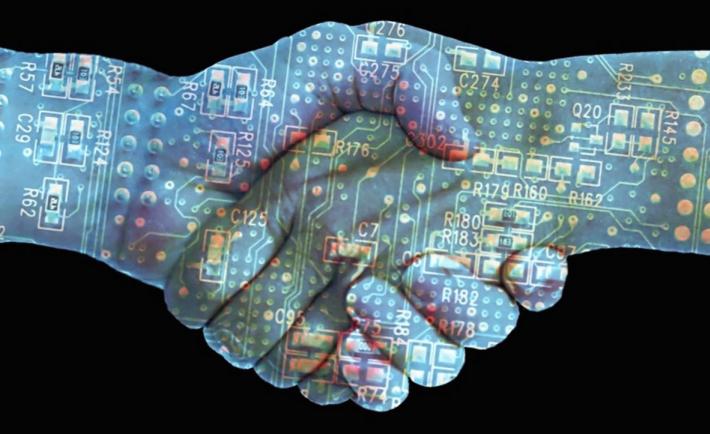On Monday, the National Democratic Institute (NDI) joined the Bitfury Group and New America to launch the Blockchain Trust Accelerator, which will work to connect governments with the technologists and resources needed to pilot blockchain applications aimed at enhancing good governance.
The blockchain -- which is, briefly put, an incorruptible and public ledger made up of data that is stored decentrally, entirely distributed and interconnected (watch this video from our friends at Institute for the Future for a very quick, simple explanation) -- is most well known for being the underlying software that was invented to enable the Bitcoin digital currency. While the future of the blockchain is still being written, it’s possible the primary uses will not even be for currency or financial technology.
Blockchains offer the opportunity to securely record transfers of any type of asset. For democratic institutions, fundamental assets like identity, votes or social services can be captured securely and permanently. Pilot uses of blockchain software that are focused on strengthening democratic accountability are already being implemented around the world. The first initiative of the Blockchain Trust Accelerator was announced in the Republic of Georgia in April, where the government is working with BitFury to create a blockchain-powered land title database.
Additional experiments have popped up elsewhere. In Ukraine, the government is conducting trials of blockchain-based election platforms for petitions and advisory votes at the municipal level. Estonian e-residents are now able to use the blockchain to self-notarize documents like marriage licenses and birth certificates. The government of the Isle of Man is piloting a blockchain registry to strengthen the transparency and efficiency of registering certain types of businesses. A political party in Denmark is using blockchain software for internal voting.
Future projects might seize on the opportunity to cut out the bureaucratic middleman, improving efficiency in the distribution of social services and the reliability of public records. The use of digital assets could allow new possibilities for participatory budgeting, spending and auditing, bringing the ‘sharing economy’ to government. Spending tracked on the blockchain is more transparent and accountable, and could illuminate the corruption and rent-seeking of dishonest officials or contractors. And the blockchain might also be used to enhance the accuracy and speed of citizen election monitoring.
"It is incumbent upon all of us who care about the future of democracy to actively work with institutions to harness civic technology that improves the effectiveness of our representative governments."
We should recognize that technological innovations often involve an element of hype, or even cyber-utopianism. The blockchain is no different. As is true of most technological innovations, there is also the potential for both positive and negative uses. Bitcoin, for example, has been used as a platform for transferring illicit financial assets largely outside the control of governments. Moreover, it is unclear whether all of the potential applications of the blockchain will materialize. As recent developments with respect to The DAO and Ethereum have shown, even if the blockchain technology represents a substantial step forward, uses of that the technology are not immune to other vulnerabilities.
NDI’s mission includes championing democratic and civic innovation. We live in a period of exceptionally rapid socio-economic and technological change. By contrast, modern democratic institutions have evolved over decades and centuries and are, by their nature, slow to reform. By many measures, the gap between the performance of democratic institutions and the expectations of citizens is widening. Closing the gap will require more rapid innovation and reform on the part of governments. Blockchain applications could allow for more frequent solicitation of citizen input on policy proposals, more secure online voting, and more flexible delegation of voting power to others. Organizations like the Democracy Earth Foundation, on whose advisory board I serve, are actively exploring these issues. It’s only through the refinement of these new processes that we can work to perfect the democratic experiment.
‘Disruption’ has turned into a Silicon Valley cliché, something not only welcomed, but often listed as a primary goal. But disruption in the private sector can have remarkably different effects than in the political system. While capital forces may allow for relatively rapid adaptation in the market, complex political institutions can be slower to react. Moreover, while disruption in an economic market can involve the loss of some jobs and the creation of others, disruption in politics can result in political instability, armed conflict, increased refugee flows and humanitarian crises. The so-called Arab Spring uprisings clearly demonstrate that the difficulty of developing and consolidating new democratic institutions is often far more difficult than the ability of tech-empowered citizens to disrupt the existing political order.
It is incumbent upon all of us who care about the future of democracy to actively work with institutions to harness civic technology that improves the effectiveness of our representative governments. There is ample evidence to support the position that technological change and disruption will not automatically guarantee a better, more democratic future. We are past the point when democratic institutions can passively sit on the sidelines of technological change. Unless they actively seek to harness this opportunities offered by new technologies, they run the risk of being overwhelmed by them.
As has been frequently noted, “democracy is not a spectator sport.”

